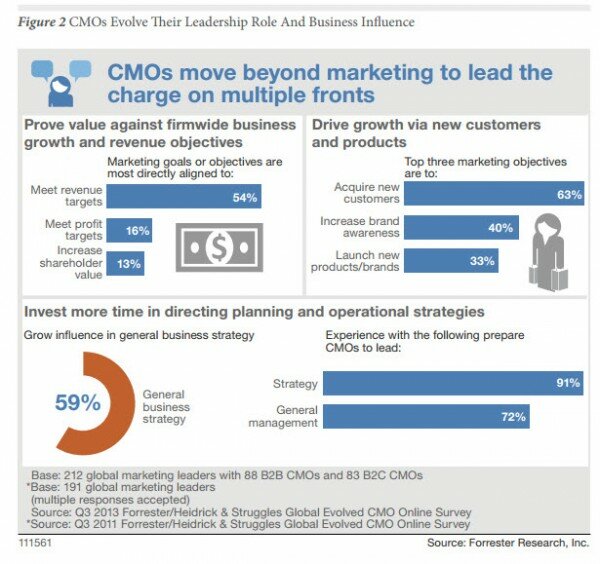The Evolved CMO: What’s the Focus for 2014 According to Forrester
Forrester has done some research into what CMOs need to spend their time on in 2014. It’s certainly still early enough to change your ways if you are a CMO trying to figure out your plan for the year. You can purchase the full report on the Forrester website, or read on for a summary of your to-do list.
The report, written by Forrester and Heidrick & Struggles is based on a global survey of 212 CMOs in July 2013. The analysis of that survey resulted in three important aspects for the CMO to focus on.
It’s not just about marketing – CMOs must become business leaders.
CMOs need to be more involved with general business strategy, ensuring a role in how that strategy is defined and executed, and in general management overall. It shouldn’t be a surprise that what CMOs do in their day to day work directly impacts revenue targets, as well as profits and shareholder value.
The relationship a CMO has with other members of the C-Suite is also key, with many noting the most important relationships are with Sales, then product/R&D. It’s also good to see that 51% of CMOs value the CIO – a relationship that is critical to an organization’s success today (whether everyone believes that or not). That 51% compares to a 2011 survey that showed only 30% valued the CIO.

Forrester; The Evolved CMO in 2014
How to Move Beyond Marketing
To continue on some of the ideas in the first section, CMOs need to play a bigger role in other business aspects. CMOs need to drive (or have a strong role in) more business activities such as product development and packaging, innovation and even mergers and acquisitions. All these areas are opportunities for CMOs to really push their ideas and help improve the bottom line in addition to marketing strategies.
According to the survey, 68% of respondents measure leads and 63% measure pipeline impact. Along with other metrics, showing how these sales improvements have grown, also clearly shows the impact marketing is having.
I think everyone recognizes that marketing needs to play a big role in the customer experience. CMOs who are smart about data, understand how products and services are designed best (through engaging customers), who clearly see the relationship with Sales as critical and really get the value of the right technology, will be the successful ones. But they aren’t going to get there alone. As Forrester points out, they need help from those who work for them and others in the company, especially the CEO.
Alignment with the CIO
The CIO is going nowhere, but it’s important that the CMO and the CIO develop a very close relationship, because in many cases each one relies on the other for his/her success. The two areas these two roles need to work closely together are developing a single view of the customer, and picking the right marketing technology to support customer management. Neither of these are commonplace yet as Forrester points out, and whether or not either will ever happen is still questionable.
CMOs Need to Lead, or Be Left Behind
The biggest takeaway from this report is that the CMO must become a leader within the company if he/she wants to be successful. Forrester offers several suggestions to make this happen:
- Get up to speed on marketing technology
- Become allies with the CIO
- Get smart about data analytics
- Have a voice in technology decisions
I think this is probably the best time to be a CMO. The opportunities are wide open, but you have to be smart about taking them on.
Print this article
Share and Enjoy
Related Articles
Building Strong Successful Partnerships is Necessary, But Not Easy
Partnerships. They are essential for any business to be successful. You can’t do it all, you can’t know it all,
Share and Enjoy
Forrester Says WCM is the Backbone of Digital Experience. Surprised?
Everyone is talking about the latest Forrester Wave for Web Content Management. By now you should have seen all the
Share and Enjoy
Forrester Wave for Web Analytics is Out, Some Question Its Accuracy
Forrester releases its Wave for Web Analytics Q2, 2014, taking us through the six providers that they believe matter the





